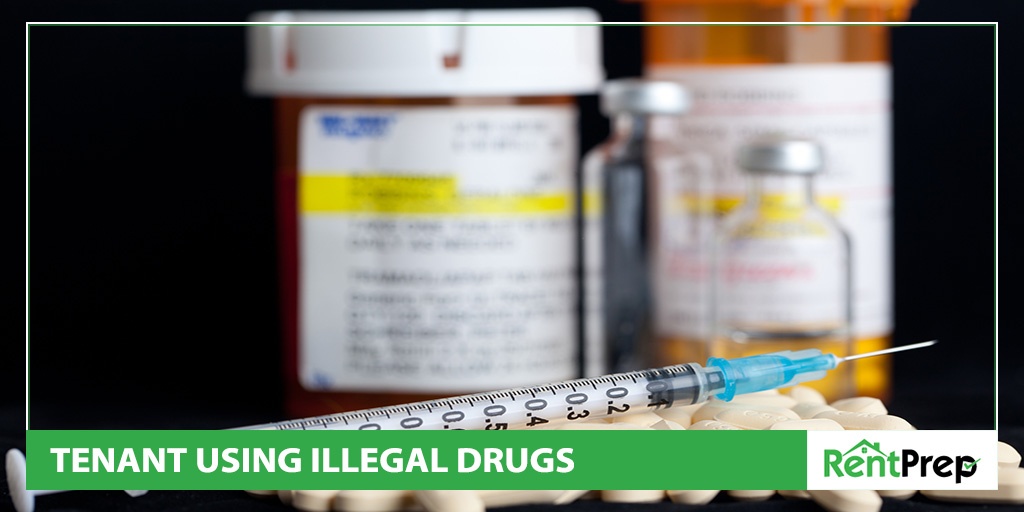
No matter how carefully you select your tenants, there is always a chance your tenant is going to end up on the wrong path. In cases where a tenant is using illegal drugs at the property, you’ll be left wondering what to do next.
Can I evict a tenant for illegal activity? Is there a tenant drug use eviction method I need to be following?
These questions and more are likely to be running through your mind. More than anything, landlords in this situation want to end it as quickly as possible that they are not putting themselves or their properties at risk any longer. Unfortunately, rushing through this type of situation can actually cause more harm than good!
Even when a tenant is involved in illegal activity, there are specific protocols involving eviction that must be followed. If you break the rules and try to evict a tenant using drugs yourself, you could end up owing them money or ending up with a judgment against you.
A tenant using illegal drugs at your property is incredibly stressful, but you need to move forward with purpose and direction. Today, we’ll cover how to deal with a tenant dealing drugs or engaging in other illicit activities. With this advice, you will have a better idea of how to proceed on the path to eviction for this type of tenant.
A Table Of Contents Dealing With Illegal Activity
- Why You Need To Be Aware Of Illegal Activity
- Warning Signs Of Illegal Activity
- What To Do If You Suspect Illegal Activity
- Know Your Rights
- Evicting For Illegal Activity
- Protecting Your Property From Illegal Activity
- How You Choose Tenants Matters
Why You Need To Be Aware Of Illegal Activity

There are landlords who are afraid of becoming too involved in their tenants’ business. It is true that landlords shouldn’t be concerning themselves too closely with what their tenants’ interests are, but there are times when you need to be aware.
Just as you would pay attention if a tenant enjoyed lighting things on fire in the yard every single night despite the danger it creates, you need to pay attention if a tenant is committing illegal activities at your property. Taking or selling illegal drugs is a dangerous activity that can put your tenant, their neighborhood, and your property at risk.
Years of hard work on your business and properties could easily be ruined by illegal activity if left unchecked. Illegal activity is a solid cause for eviction, so you will want to ensure you are as aware as possible of it happening at your property to protect the neighborhood and your assets.
Warning Signs Of Illegal Activity
Landlords should never jump to conclusions about their tenants. Even if you suspect a tenant is involved in something dangerous or illegal, you must validate any suspicions before you move forward towards eviction. Accusing a tenant of something with no basis could lead to huge problems for you both, so you want to avoid that at all costs.
Rather than planning to investigate tenants because you are suspicious of them, keep in mind there are some major red flags you should be looking out for with every tenant. After all, a tenant dealing drugs might not look any different than your very best tenants!
These warning signs are great signs to keep an eye out for.
Strange Odors
If you or other tenants in the building notice strange chemical odors in the area, those smells could be a red flag. Many at-home drug manufacturing processes create ammonia or other strong smells that are a red flag for drug sales.
Smells should be investigated through a standard, tenant-sanctioned checkup. Remember you cannot simply enter the property to find the source of the smell; the tenant needs to be made aware of any inspections.
Another important thing to keep in mind is that some states allow recreational or medical marijuana to be grown at home in small quantities; do not plan to pursue eviction against a tenant if this is the case in your state unless it is forbidden in your lease agreement.
Uptick In Foot Traffic
One potential sign of a tenant dealing drugs is frequent visitors. Drug dealers will have many people coming in and out of the property at all times with little regard for the time.
Visitors, however, are not a sure sign of illegal activity! Some tenants simply have large social circles or families that visit at all times. Do not assume that frequent visitors equates to illegal activity. Rather, pay attention to any strange differences in the number of visitors.
Utility Bills
At-home drug creating processes are going to use more electricity and water than a typical rental property would. If the unit of a tenant you suspect is involved in illegal activity has very sudden spikes in usage, this could be a warning sign. There could also, however, be a more benign reason such as a new TV or appliance.
All of these signs, including an uptick in utility bills, are not sure signs of any illegal activity. They are simply warning signs. If you notice any of them at your properties, it’s time to take a closer look and maybe even talk to your tenant about what you have noticed, such as questioning a spike in the electricity.
Keeping open communication with your tenant, even when you are suspicious of your activity, is likely to lead to a better outcome than creeping around behind closed doors.
What To Do If You Suspect Illegal Activity
While it might be tempting to immediately try to evict a tenant you suspect is partaking in illegal activity at the property, you cannot do this without having clear evidence. The warning signs above are a signal to take some preventative and investigative measures.
Here is what to do if you suspect a tenant using drugs or dealing at the property.
#1: Document Everything
Throughout this entire process, it is important to document everything. Copy down reports you receive from other tenants; write down your suspicions as well as details of any conversations had with tenants about your concerns.
If this situation comes to a point of needing to evict the tenant, you will need to have substantial and clear evidence of what was happening at the property.
In particular, make sure to document the following:
- Reports from neighbors or other tenants
- Records of unusual utility bills
- Takedown anonymous information from witnesses or anyone who contacts you about the tenant in question
#2: Talk To An Attorney
If you aren’t sure what your local or state laws are about dealing with illegal activity in rental properties, it might be best to get an attorney to help. Choose a local attorney who specializes in property law to help you sort through this mess.
It is possible to move through the eviction process without assistance, but it is also possible to lose an eviction case over simple procedural mistakes. Having a property law attorney on your side will lower the risk of unnecessary mistakes.
#3: Contact The Police
If landlords who have a substantial and well-founded idea that a tenant is partaking in illegal activity, it is a good idea to get your local narcotics division involved. They may have a case in the works, or they may be able to provide you with the relevant information and evidence that you need to carry out an eviction.
Remember, the eviction process must still happen even if the tenant is arrested or otherwise convicted of a drug-related crime. Eviction is its own process specific to their housing lease, so you must follow through with it regardless of the tenant’s legal status.
Know Your Rights
Unfortunately, you may find yourself in a situation where you suspect your tenants are using or dealing drugs, but they claim otherwise. They may even point out that they suffer from addiction, and addiction is a protected mental disability under the Fair Housing Act.
Even though it is illegal to discriminate against someone for their addiction to drugs or alcohol, it is not illegal to protect your property from illegal activity happening on the premise. The line here can be confusing, but drug use is illegal even if someone is battling their addiction. If they are using on your property or dealing, they are breaking the law and your lease.
Keep in mind that while it is OK to be compassionate to the suffering that addiction causes in others, you are still allowed to protect your own property and rights. If the lease has been broken by illegal activity on the premises, move forward with an eviction as soon as possible.
Evicting For Illegal Activity

Once you have the evidence needed to support an eviction for illicit drug use or sale, it is time to move forward with an eviction. You want to evict a tenant committing illegal activity as soon as possible, so you should send out an eviction notice as soon as you have solid evidence. The evidence might even come directly from the police after they arrest or charge a tenant.
The eviction process you will follow will likely be a breach of the lease agreement. Most standard lease agreements include a clause that forbids criminal or illicit activities; you can find out more about how to update your lease to include this in the following section.
The Eviction Process
Though the reason for eviction might be different than one you have ever dealt with before, the overall process is very similar. You cannot simply tell the tenant to leave; you must file for eviction and follow the complete process through the court system.
The steps are going to remain the same:
- Send the eviction notice to the tenant.
- Wait for the required amount of time.
- File for eviction with the court system.
- Wait for the court to serve notice of a court date.
- Prepare evidence.
- Bring it to court and make your case.
If a judgment is made in your favor, you will then be able to request help from the local constable to serve the notice. This often incurs a fee, but it is especially useful to have some help on your side when evicting tenants involved in illegal activity as the situation can be unpredictable at times.
To find out more about eviction and how to handle every step of this process, read our complete eviction guide for landlords.
Post-Eviction Problems
Unfortunately, tenants that took part in illegal activity often leave behind big messes. Sometimes this is done out of anger because of the eviction. While you can use the security deposit to do any necessary repairs, the needed repairs might cost more than the deposit itself.
Consider how much of a loss you can take. If the loss would be substantial, it might be worthwhile to file a claim in small claims court to recoup the lost amount from the tenant. If, however, the loss can be managed by your company, it is probably best to walk away.
Winning judgments from small claims court can be notoriously hard to carry out, and it might take months or years to see any of the repair money. Most landlords find that this process is not worth the frustration. Having the tenant out of the property and out of their hair is enough; the cost can be dealt with in other ways.
State And Local Laws
The laws at the state and local level may have some additional provisions about how drug-related evictions need to be handled, so make sure to consult with a local property law attorney to be sure of the timelines you need to follow.
For example, most states allow you to file for eviction with no opportunity for the tenant to cure the situation if drugs are involved. Other states have a shorter time frame that can be followed to speed up the eviction process when illegal activity is discovered. To be sure you are taking care of your property as quickly as possible, you want to be caught up on these laws and regulations.
The bottom line in all states and situations, however, is that you need to have clear evidence of drug sale or use. Do not file for eviction unless you have this or some other clear evidence of a breach of contract for the lease agreement.
Protecting Your Property From Illegal Activity
To ensure the eviction process in cases involving illegal activity can be processed as seamlessly as possible, you will want to make sure your property leases include the correct language.
A well-written lease should include a clause that forbids criminal conduct or illicit drug activity. This would include both using and selling drugs at the property in question. Additionally, the clause should extend to cover any guests of the tenant as well.
While many states have provisions that allow for eviction in these circumstances regardless of what is written in the lease agreement, having a clause in the lease, in addition to state laws, will make your case an easy victory.
How You Choose Tenants Matters
As with all eviction situations, you will be left wondering what you could have done differently to avoid ending up needing to deal with this. There is no way to 100% avoid evictions; that’s just the nature of humans and the rental business.
One thing you can do to lower your risk of dealing with illegal activity evictions again in the future is to review your tenant selection criteria. Choosing the best tenants is very difficult to do, but it is important to take the tenant selection process seriously so your property is left in good hands.
If you aren’t sure how to work through the selection process more successfully in the future, getting help from a tenant screening service like RentPrep can help.
Illegal Activity: A Big Deal
Tenants are not allowed to engage in illegal activity anywhere; after all, the activity is illegal! That means they cannot use illicit drugs or sell them at your property. If they do, you have the right and the means to evict them.
It is important, however, to remember not to jump the gun when faced with this situation. You need to move methodically, preferably with a lawyer and the law on your side. Hard evidence rather than unfounded suspicions are going to be what gets you through to the other side of eviction, so keep your head on straight and be sure to document everything.
Dealing with drug-related incidents as a landlord is never going to be an enjoyable occasion. The most you can do is ensure you are doing everything you can to follow the letter of the law and protect your business.

